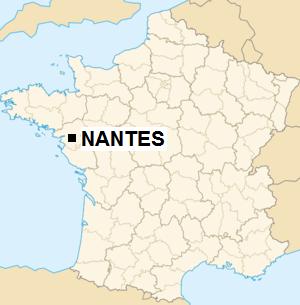|
Our sailing ship WMCW has now weathered
the storm and all hands are on deck. We are sailing towards the
west coast of France arriving in Nantes the Capital of the Pays de la
Loire located on the Loire River, for our International Seminar and
General Assembly.
 The Executive Council
of the World Movement of Christian Workers has Chosen the theme of
Globalisation and Migrant Workers for the International Seminar. The Executive Council
of the World Movement of Christian Workers has Chosen the theme of
Globalisation and Migrant Workers for the International Seminar.
Every year, millions
of men and women leave their homelands in search of a decent life for
themselves and their families. Most are motivated by the quest for higher
wages and better opportunities; some are forced to leave because of
famine, natural disasters, violent conflict or persecution. The International
Labour Office estimates that there are about 90 million are migrant
workers. Traditional migration is from the South to North yet the trend
is towards a growing immigration within the developing world.
Current migration
is closely linked with features of globalization; a widening income
gap between the rich and poor parts of the world also spurs people to
seek economic opportunities elsewhere. These factors, combined with aging
populations in many developed countries, mean migration is likely to
continue to increase.
The fears surrounding the impact of immigration
on developing countries are unfounded. There is no evidence that immigration
reduces wages or pushes up unemployment. The economic picture is less
clear-cut when it comes to the countries left by migrants. Advantages
include migrants’ remittances, lower unemployment, less population
pressure and knowledge brought by returning migrants. On the downside,
emigration often entails loss of skilled workers and dynamic young people.
It also can reduce a country’s output and tax revenues.
The Migrant Worker Reality
Many migrant workers frequently find
themselves without the proper documents or papers and have to work clandestinely
in their host country. They are often referred to pejoratively
as “illegal”. The increase in clandestine migration,
including trafficking, threatens human rights and creates new challenges
for national governments and the international community. A growing
number of migrants find themselves in vulnerable situations, mainly
because of their lack of documents and irregular status or the kind
of work they do, and many face discrimination.
The social upheavals that migration produces
in both sending and receiving countries can be far-reaching and destabilizing.
There are many difficulties surrounding integration of people from different
cultures, backgrounds and race. This integration is made worse in host
countries where there is a decline in traditional industries with the
resultant mass redundancies and long-term structural unemployment of
native workers. Political extremist movements espousing
racism and xenophobia exploit these difficulties blaming migrant workers
for causing unemployment.
Building Solidarity with Migrant Workers
to create Decent Work
The WMCW we recognises migrant workers
as, our sisters and brothers. To welcome the migrant, it is to welcome
God among us. In the Church there is no stranger. The Gospel of love
of neighbour at home and abroad (MT 22,34-40) requires clear actions
of solidarity with the stranger. We have to take more seriously
our vocation to walk with migrant’s workers, in whom the face of Christ
can be seen.
As a workers movement we cannot shy away
from the fact that migration is a complex issue requiring solutions
to worker problems for migrant and native workers alike. The failure
of the global economy to give an equal participation in the sharing
of the wealth created for workers at home and abroad is a threat and
a challenge to all women and men of good will struggling to build genuine
international worker solidarity.
|

